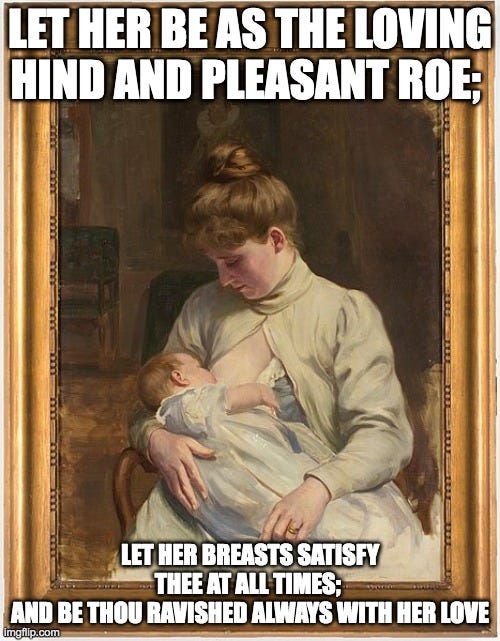Behold, thou art fair, my love; behold, thou art fair; thou hast doves' eyes within thy locks: thy hair is as a flock of goats, that appear from mount Gilead.
Thy teeth are like a flock of sheep that are even shorn, which came up from the washing; whereof every one bear twins, and none is barren among them.
Thy lips are like a thread of scarlet, and thy speech is comely: thy temples are like a piece of a pomegranate within thy locks.
Thy neck is like the tower of David builded for an armoury, whereon there hang a thousand bucklers, all shields of mighty men.
Thy two breasts are like two young roes that are twins, which feed among the lilies.
Until the day break, and the shadows flee away, I will get me to the mountain of myrrh, and to the hill of frankincense.
Thou art all fair, my love; there is no spot in thee.
Song of Solomon 4:1-7
Introduction
The Brothers Kryn posted an interesting post, with even more interesting comments, focusing on the difference between the way JRR Tolkien and George Martin have covered sexual issues in their books. Martin has lots of raunchy and perverted sex scenes, and claims that that’s life and we should be writing fiction like that. (This from a man who writes about dragons.) Tolkien, on the other hand, didn’t write any sex scenes in his Hobbit/LOTR books.
The question that came out was, then, how should Christian writers of fiction handle sex? The Tolkien way? The Martin way? Or… the Biblical way? Obviously you already know my conclusion; we should be looking toward the Scriptures for our judgement and inspiration for our own writing. And so I decided to do a study of sex in Scripture.
Limitations
Now, as we think about applying this study to our fiction writing there are some serious limitations to point out:
You have to care what the Scriptures say in order to care, umm, what they say. If you reject the Scriptures, then you’re going to have to get your ‘how to put sex in fiction’ guidelines from somewhere else. Perhaps 1001 nights.
You have to decide what relationship you believe that the Scriptures, which relate history, law, and theology, have to fiction, which is pure story. Unless you limit yourself to the parables (which are presumably fiction, but that isn’t actually clear), then you might think you are comparing apples to oranges.
You also have to decide what relationship a book that God wrote has to do with a book you are writing. “What Would Jesus Do” was a popular slogan, but not everyone is comfortable translating ‘What God Wrote” into “What I Write”. You might think that God is able to write about rape and incest, but you can’t handle it.
You also have to realise that writing about something isn’t just a binary of ‘yes/no’, but involves all sorts of permutations of ‘how’. Even when they were translating Martin’s books into film there were all sorts of changes. To say, “Jill walked into the room naked” in writing is not at all the same thing as getting the Actress Reallia Importanta to walk into the room naked, on film, fully visible to everyone. To say ‘And Adam knew his wife and she conceived’ is not the same as a half-hour sex scene on the grass.
So, given those limitations and some others I probably haven’t thought of, here goes:
Body Parts
I don’t think there is anyone on Earth who will be happy with the list of body parts that the Scriptures speak about. The ‘porn is great’ types will be unhappy with some of the things left out or euphemised, as well as some of the things that are front and centre; and the conservatives will be very unhappy with two things that are clearly visible, and a couple of others that are present in implication or euphemism:
Clearly Present
The overwhelming majority of the human body, male and female is not only mentioned, but mentioned clearly, and mentioned in sexual circumstances. Eyes, ears, hair, nose, neck, arms, legs, thighs, stomach and belly button are all mentioned. 1Clearly, obviously, and in a sexual circumstance.
Breasts and Breastfeeding
The female breasts are also mentioned. Clearly and by name and in sexual circumstances.2 They are placed in the same category as all of the other clearly mentioned body parts.
But they are also mentioned in their role as feeders of infants. They are mentioned clearly, by name, without euphemism, and in public. They are ‘drawn out’, they help determine who comes to certain meetings, the end of their use for a given infant is celebrated as a milestone.3
Male Member and Circumcision
The male member is never mentioned in sex. Sex itself is mentioned, so it was obviously present in those scenes, but as far as sex is concerned, never mentioned.
It is mentioned in other scenes, however, and rather openly. The law mentions that damage to the male member makes a male disqualified from entering the temple,4 a woman grabbing it during a fight between males is to have her hand cut off,5 the stories talk openly about ‘eunuchs’6… and then there is circumcision. Old Testament, New Testament, circumcision and foreskin are quite frequently mentioned.7
Oh, and the OT word for grown up male is ‘those who pee against the wall’.8
Female Genitalia
The female genitalia, on the other hand, is not mentioned except in euphemism. And pretty dramatic euphemism if at all.9
Types of Sex
Positions
Sexual positions, if mentioned at all, are mentioned only very euphemistically.10 Very euphemistically. Oral sex, ditto.11 Coitus interuptus is mentioned. Once. And roundly condemned. 12
Perversions
Sexual perversions are mentioned but always in euphemism. Male on male sex, female on female sex, rape, sex with animals… all are mentioned and condemned. Never described.13
Regulations
Limitations on who and when can marry (and thus legitimately have sex) are listed. Laws against incest. Laws against sex during the period or immediately after childbirth. Adultery, fornication, lust… all are forbidden.14
Marriage
Marriage is mentioned, and sex in marriage is mentioned. Routinely. And openly, although not in graphic description.15
Sexual Goals
Sexual goals are mentioned in Scripture. Especially children.16 But including pleasure, companionship, prevention of sexual sin,17 etc.
Conclusion
My goal for this post was to lay out what is actually in Scripture, not to define exactly how we should use sex in our fiction. It is to put guidelines on both sides of the discussion… pointing out that, yes, Scripture does talk about this or that, and does use these kinds of words… but, no, Scripture doesn’t talk about this or that, or use these kinds of words. And to point out that how Scripture speaks when it does speak.
Some Scenarios
So, how do we work these principles out? Here are some scenarios that I am working through:
A young woman is in an arranged marriage. One of the things she struggles with is the physical relationship. She has a view of sexuality that sees sex as dirty, or at the least unchristian. How much detail can I go into in portraying this conflict in her mind and in her marriage? How much can she share with her mother and other confidants?
A young man is on the front in World War I, and faces various sexual temptations as well as a relationship by mail with a young woman back home. How overt can these temptations be?
In a coming of age story with young men, how much can be said as they make the transition from ‘girls have cooties’ to ‘girls are cute’… and all of the temptations that involves?
When writing historical fiction there are things that are much more… earthy and open than they are now. Boys frequently swam naked together, families lived in very small quarters and thus bathing and other issues happened in view or at least sound of each other. Articles of clothing that we take for granted might be completely missing. Does the Christian author ignore history?
How important is marriage (and thus sex in marriage) compared to getting a good job, getting a good education, getting your career in place, etc. How should the Christian fiction writer deal with these issues?
These are just the tip of the iceberg when it comes to issues that the Christian Fiction writer has to deal with in writing about sex in Christian Fiction.
Thank you for reading Von’s Substack. I would love it if you commented! I love hearing from readers, especially critical comments. I would love to start more letter exchanges, so if there’s a subject you’re interested in, get writing and tag me!
Being ‘restacked’ and mentioned in ‘notes’ is very important for lesser-known stacks so… feel free! I’m semi-retired and write as a ministry (and for fun) so you don’t need to feel guilty you aren’t paying for anything, but if you enjoy my writing (even if you dramatically disagree with it), then restack, please! Or mention me in one of your own posts.
If I don’t write you back it is almost certain that I didn’t see it, so please feel free to comment and link to your post. Or if you just think I would be interested in your post!
If you get lost, check out my ‘Table of Contents’ which I try to keep up to date.
Thanks again, God Bless, Soli Deo gloria,
Von
The list of verses here would be far too long, most of them are found in the Song of Solomon.
See the Song of Solomon and Proverbs 5 for prominent examples.
See Psalm 22:9 for an example.
Deut 23:1
Deut 25:11
II Kings 20:18
It is mentioned about 50 times in the NT alone.
The expression is used at least six times in the Old Testament.
The principle example would be ‘uncover her nakedness’, ‘issue of blood’ referring to menstruation, and the word ‘navel’ in the Song is thought by some commentators to refer to the vagina.
In the Song and Proverbs 5.
If this is talked about, it is in the Song. However it is so euphemistic that there is no clarity to it.
Genesis 38:9
Throughout the law and in Romans 1.
The law, the rest of the OT, and the NT are full of these condemnations.
The Song of Solomon has several sex scenes. The OT has the euphemist ‘knew his wife’, ‘come in unto’, and ‘lie with me’, the New Testament ‘come together’. Leah and Rachel argue about who will get to sleep with Jacob, and Sarah, Leah, and Rachel all give their maids to their husbands to produce children. One of David’s sons lay with his father’s wives openly in front of the whole city.
Genesis 2, Psalm 127, Psalm 128, Malichi 2, I Timothy 2:15 amongst other places.
See Proverbs 5 and I Corinthians 7








